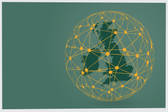Arctic and High North Security Dialogue
The Arctic and High North have become more strategically relevant for the UK and the security of Northern Europe, with changes driven by geopolitics and climate change.
The Arctic and Europe’s High North have become strategically important to the UK. Yet upholding a tension-free Arctic is likely to become more difficult, as the effects of climate change – the opening of sea routes and access to natural resources – create new opportunities but also new governance requirements, while encouraging regional competition and even conflict. Russia’s military modernisation is promoting a shift in the regional security environment that requires a reconsideration of regional hard security concerns.
The Arctic and High North have not previously featured prominently in UK defence and security policy documents. But, since 2018, more focus has been given to the region, as referenced in both the 2021 Integrated Review and the Defence Command Paper.
This project was undertaken in partnership with the British Embassy in Reykjavik and the Institute of International Affairs at the University of Iceland.
Project sponsor
British Embassy Reykjavik
The British Embassy in Reykjavik maintains and develops relations between the UK and Iceland.
Find out more
Aims and objectives
This expert-led dialogue on Arctic and High North security aimed to:
- Provide a greater understanding of the significance of the Arctic for the UK’s security and what the UK’s role in the Arctic should be from the perspective of Nordic and Baltic allies.
- Hold regional discussions on how to maintain low tensions within the Arctic and High North while addressing mutual security concerns.
- Facilitate more informal discussions and explore the value and potential modalities of a dialogue on Arctic security.
- Re-engage all Arctic actors and key neighbours (Joint Expeditionary Force members) within the Arctic military-security context to build and consolidate networks.
The public panel discussions considered:
- How climate change is altering the geopolitics of the Arctic and the impact on security concerns for European states.
- The different format(s) for increasing cooperation on Arctic security that could be enhanced or created.
- Emerging risks and how these can be mitigated, as well as opportunities that present themselves for the Arctic and High North.
- The management of tensions within the Arctic and the hard power levers available to the UK and its allies.
Project outputs
Access relevant episodes of the Global Security Briefing Podcast
Roundtable and panel discussions
‘Hard security concerns within the Arctic and High North’ - This was held as an invite-only, expert-led policy roundtable discussion
‘The future of Arctic and High North Security’ - This was held as a public panel discussion.
Project impact
This Arctic and High North security dialogue researched contemporary strategic issues for the UK and Europe in the region. The timing of the project was pertinent, with the UK Ministry of Defence publishing its long-awaited ‘The UK’s Defence Contribution in the High North’ paper. Moreover, our Global Security Briefing podcasts included discussions related to Russia’s reinvasion of Ukraine and the spill-over effect this would likely have on governance and cooperation in the Arctic. The public panel discussion on ‘The Future of Arctic and High North.







